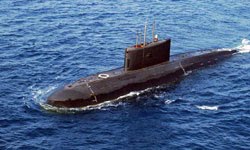Iranian subs to the Red Sea – riposte for nuclear watchdog’s indictment
The deployment of Iranian "military submarines" in the Red Sea, announced Tuesday June 7, was Tehran's response to the latest International Atomic Energy Agency's report accusing Iran of nuclear work with "possible military purposes." It was also a pointed comment on the controversy in Israel over whether or not to go for the military option. President Mahmoud Ahmadinejad then delivered his most uncompromising statement yet on Iran's nuclear program, calling it "a train with no brakes or reverse gear."
Iran claimed its submarines had long-range capabilities without specifying how many or what types had been sent to the Red Sea. Our Western military sources estimate that two vessels of the Qaem type defined as "semi-heavy." Information about this submarine is sparse in the West: It is thought to be a multi-task 1,000-ton submarine capable of firing missiles from deep water with room for naval commando units trained to raid strategic targets.
Shortly after Tehran's submarine announcement, Iranian President Mahmoud Ahmadinejad called a news conference in which he presented Iran's nuclear case in exceptionally categorical and inflexible terms. After dismissing the UN watchdog's report as "lacking legal credibility," he declared: "The nuclear issue is like a train which has no brakes and no reverse gear, which means there will be no compromise."
IAEA chief Yukiya Amano also criticized Iran Monday, June 6, for not cooperating with international nuclear experts at the start of a weeklong board meeting in Vienna.
This too was Tehran's reply the Wisconsin Project on Nuclear Arms Control, whose key findings were published by debkafile on June 3: "By April 2011, Iran had accumulated a quantity of U-235 that can be enriched in short order to sufficient 90 percent (weapons grade) uranium for producing four nuclear bombs, steadily stockpiling the material in secret from 2008."
According to our Iranian sources, the Iranians felt bound to respond to the information that the Israeli Navy has taken delivery – or will shortly – of two new Dolphin submarines armed according to foreign sources with nuclear missiles. The arrivals will expand Israel's nuclear-capable sub fleet to five – or a 66 percent increase.
Ahmadinejad's hardnosed comments were aimed too at Washington, where German Chancellor Angela Merkel and President Barack Obama held talks inter alia on the nuclear issue and agreed to pile more sanctions on the Islamic Republic if it continued to forge ahead with its nuclear weapons program.
Israel's Dolphin subs are manufactured in German shipyards. The chancellor agreed to speed up delivery of the last two Israel commissioned and made the gesture of easy terms of payment, despite the economic crisis besetting Europe.
The way Tehran announced the Red Sea deployment of its submarines indicated an intention to push the radius of its defense lines farther from home waters in the Persian Gulf to the Red Sea in case of military attack on its nuclear program.
debkafile's military sources reckon that Iran will next send the submarines through the Suez Canal up to Syria's naval base of Latakia on the Mediterranean.
Five months ago, Iran sent two warships, one of them bearing missiles for its Lebanese proxy Hizballah, along the same route to the same destination. The Egyptian military junta permitted the warships to pass through Suez just a week after Hosni Mubarak was ousted as president, signaling clearly that Cairo was turning a new leaf in relations with Tehran and its Palestinian ally, Hamas, after years of animosity with Mubarak's Egypt.
Six days after those first warships docked in Syria, on Feb. 26, Moscow agreed to sell Syria advanced Yakhont SS-N-26 sea missiles. Every Israeli effort, backed by Washington, to discourage the Russians from letting Syria have those weapons was rebuffed. They may well arrive in Syria at the same time as the Iranian subs.
The interconnection of these steps was underscored two days later, on Feb. 28, when the commander of the Iranian Navy, Adm. Habibollah Sayyari, arrived in Latakia, inspected a guard of honor and declared that Iran had acquired its first Mediterranean base.
Neither the United States nor Israel reacted to these strategic milestones. The second round of Iranian warships, the submarines, heading through the Suez Canal to Syria, may also go without response.


